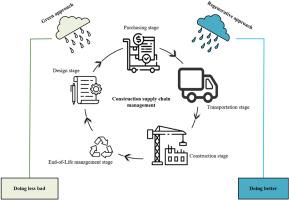From green to regenerative supply chain management in construction: Towards a conceptual framework
IF 4.7
2区 环境科学与生态学
Q2 ENVIRONMENTAL SCIENCES
引用次数: 0
Abstract
Green Supply Chain Management (GSCM) has emerged as a valuable managerial strategy in the construction industry, dedicated to instilling environmental sustainability principles throughout the lifecycle of construction projects. Despite its wide adoption, the built environment continues to generate numerous negative environmental impacts such as significant greenhouse gas emissions, resource depletion, excessive waste production, habitat destruction, and more, thus intensifying climate change. To address this, a shift toward regenerative thinking that goes beyond minimizing negative impacts to actively regenerate ecosystems, restore depleted resources, and regenerate damaged habitats is deemed necessary. This study builds on established GSCM practices and identifies their shortcomings in achieving ‘true sustainability’. In response, it introduces a novel Regenerative Supply Chain Management (RSCM) framework that incorporates key regenerative principles: Focus on Place, Harmony with Place, and Co-evolution which offers a more comprehensive approach, facilitating a transition towards regenerative practices. Overall, this framework not only offers insights into advancing green or sustainable thinking in construction but also provides practical implications for the industry. By embracing regenerative practices, the construction sector can actively restore and renew the built environment, fostering a more restorative and resilient future.

从绿色到再生的建筑供应链管理:建立概念框架
绿色供应链管理(GSCM)已成为建筑行业一项重要的管理策略,致力于在建筑项目的整个生命周期中灌输环境可持续发展原则。尽管绿色供应链管理被广泛采用,但建筑环境仍然对环境造成了许多负面影响,如大量温室气体排放、资源枯竭、废物过量产生、栖息地遭到破坏等,从而加剧了气候变化。为解决这一问题,我们认为有必要向再生性思维转变,不仅要最大限度地减少负面影响,还要积极地再生生态系统、恢复枯竭的资源和再生被破坏的栖息地。本研究以既定的 GSCM 实践为基础,指出了它们在实现 "真正的可持续性 "方面的不足之处。作为回应,它引入了一个新颖的再生供应链管理(RSCM)框架,其中包含了关键的再生原则:它提供了一种更全面的方法,有助于向再生实践过渡。总之,该框架不仅为推进建筑业的绿色或可持续思维提供了见解,还为该行业提供了实际意义。通过采用再生实践,建筑行业可以积极恢复和更新建筑环境,促进更具恢复力和复原力的未来。
本文章由计算机程序翻译,如有差异,请以英文原文为准。
求助全文
约1分钟内获得全文
求助全文
来源期刊

Environmental Development
Social Sciences-Geography, Planning and Development
CiteScore
8.40
自引率
1.90%
发文量
62
审稿时长
74 days
期刊介绍:
Environmental Development provides a future oriented, pro-active, authoritative source of information and learning for researchers, postgraduate students, policymakers, and managers, and bridges the gap between fundamental research and the application in management and policy practices. It stimulates the exchange and coupling of traditional scientific knowledge on the environment, with the experiential knowledge among decision makers and other stakeholders and also connects natural sciences and social and behavioral sciences. Environmental Development includes and promotes scientific work from the non-western world, and also strengthens the collaboration between the developed and developing world. Further it links environmental research to broader issues of economic and social-cultural developments, and is intended to shorten the delays between research and publication, while ensuring thorough peer review. Environmental Development also creates a forum for transnational communication, discussion and global action.
Environmental Development is open to a broad range of disciplines and authors. The journal welcomes, in particular, contributions from a younger generation of researchers, and papers expanding the frontiers of environmental sciences, pointing at new directions and innovative answers.
All submissions to Environmental Development are reviewed using the general criteria of quality, originality, precision, importance of topic and insights, clarity of exposition, which are in keeping with the journal''s aims and scope.
 求助内容:
求助内容: 应助结果提醒方式:
应助结果提醒方式:


